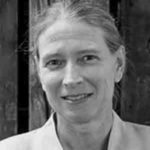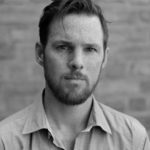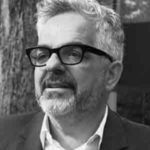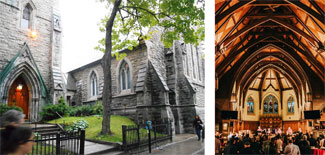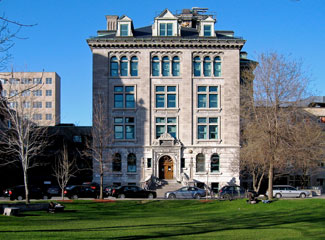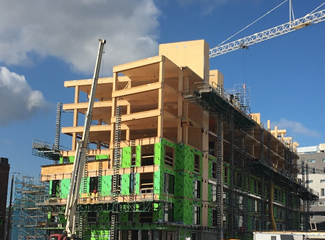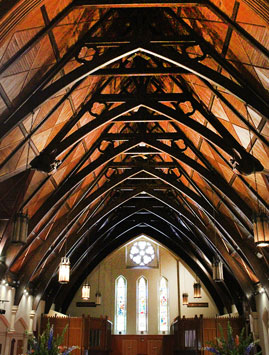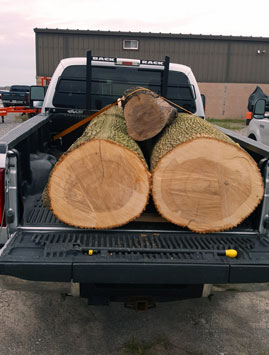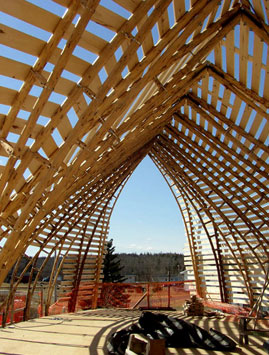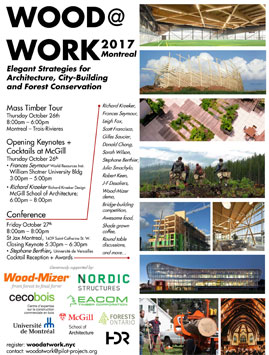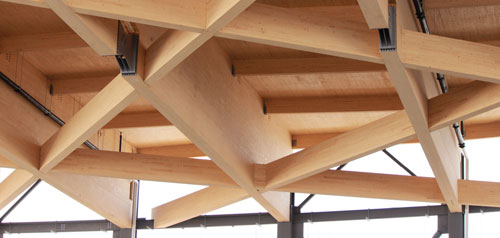Keynote Address: Wood as a Link Between Design, Sustainability and Cultural Value
We are often made aware of the connection between our forests and large scale industry, and overlook the connections between communities and the forests in which they exist. Resource extraction offers limited returns for local communities. The talk will take us through a design process that focusses on ways of thinking about wood, and how our forests can sustain us at the community scale through a local value-added process.Richard focuses on issues related to cultural continuity and environmental response. He has done work with indigenous communities whose culture and physical environment are under threat from external forces. He is interested in the strategies adopted by cultures with close links to the natural world as an important precedent for the contemporary practice of architecture, and as a source of information about who we are and where we are. Richard's design practice in Halifax, Nova Scotia, Canada prioritizes usability and ecological sustainability and takes inspiration from early Native American designs and materials.
2017's conference was held in Montreal, Canada, one of North America's most dynamic urban centers and an epicenter of its mass timber revolution. We continued to explore leading-edge thinking and practice in the use of wood to build sustainable cities, protect forests, reduce climate change, and support human well-being.
The conference was co-hosted by McGill University on its campus, and by St Jax Montreal, a beautiful historic stone and timber church in the heart of downtown. Participants toured new mass timber buildings in Montreal and Trois Rivieres during the day of October 26th, followed by an opening keynote and cocktails at the McGill School of Architecture.
Students from four local universities competed to build the best 10'-foot bridge, using wood from reclaimed urban trees, cut on-site with a portable sawmill. Other highlights: furniture crafted on-site, tropical forestry, young entrepreneurs, biomass energy, global city-forest partnerships, and samples of sustainable forest foods.
The presenters at Wood at Work 2017 included:
Keynote Address: Creative Innovations in Timber Design in France, from the 1950s to Present Day (Innovation et création dans l’architecture de bois en France, de 1950 à aujourd’hui)
This talk follows the resurgence of timber architecture in France, from second half of the 20th century to present day. Beginning with an overview of the wood construction experiments of a material that was considered archaic after WWII, then raised to the status of a 'modern material' from the 1960s, to eventually being acknowledged as the leading building material for ecological construction. The lecture will examine timber's transitional use from arts and crafts to industrialization via the evolution of construction methods, and from hand-operated tools to mechanical to digital, and these influences on architecture.Stéphane is an architect graduate from EPFL in Switzerland, and a PhD Tutor/Lecturer at l'Ecole Nationale Supérieure d’Architecture (ENSA) de Versailles. He studies architecture as a field of experimentation of technical innovations. [Download lecture details, en français et anglais, as a pdf]
McGill / MSSI lecture: Tropical Forests and Climate Change: How research can help transform a problem into a solution
Keynote address: "Thinking Globally, Trying to Act Locally -- An Update"
Just how important is it to conserve and restore the world's tropical forests? Frances will speak about the big picture of forests climate change through the lens of her global research and policy advising, with examples of strategic interventions at a variety of scales, including sustainably sourced timber and new policy frameworks.
Frances Seymour is a Distinguished Senior Fellow at WRI, where she conducts research and writing on forest and governance issues. A former Senior Fellow at the Center for Global Development, she also served as Director General of the Center for International Forestry Research (CIFOR) from 2006 to 2012. Prior to that, Frances was the founding director of the WRI's Institutions and Governance Program (now the Governance Center) at WRI. She is the lead author of the book, Why Forests? Why Now? The Science, Economics, and Politics of Tropical Forests and Climate Change. She has been awarded France’s Order of Agricultural Merit.
Towards a more holistic urban forestry system
Every year in North America, billions of dollars of potential lumber from urban trees is destroyed as firewood, mulched or taken to the landfill. Every tree in every city will die. Why not have a plan for the wood? If we can grow food in the city, why not grow lumber in the city too? David Barmon will discuss not only how to better utilize the wood from current removals but also retool urban forestry to plan for the future with urban lumber in mind.
Over the last decade, David has been a strong advocate not only for the better utilization of wood from urban tree removals but also for intentionally growing urban trees for lumber. In 2015, David worked with the Oregon State legislature to fund the Clackamas County Urban Lumber Pilot Project, a feasibility study to determine the economics of a more holistic urban forestry system. David envisions a future where urban trees can be planted and managed to yield high quality lumber. This will give landowners an incentive to plant billions of new trees around the world and stop the rampant waste of chopping up city's trees.
Periphery Timber
For populations living in regions with extremely harsh climates and poor access to durable construction materials, building thermally comfortable homes is a challenge. Our MIT research group is working with the Tata Foundation in Northern India and central Nepal to develop new solutions for insulated, durable and affordable housing, focusing on the use of plant fiber-cement composite wall panels which are easily produced on site using available wood waste materials from past construction projects.
Andrew is currently at MIT researching material solutions for affordable housing in resource-limited settings. Andrew has worked for an architecture firm in East Africa, and managed the design and the construction of schools, hospitals and housing projects built with maximum labor and minimal imported materials.
Donald Chong will provide ‘field notes’ on his architectural portfolio in which competing structural and material elements saw the emergence or, perhaps re-emergence, of wood — as the recurring and progressive material of choice for his projects in both rural and urban settings.
Integrated landscapes; Trees, food and education near and far afield
Eden Canada's mission is to fight climate change through the conservation and restoration of ecosystems and the preservation of biodiversity. Its strategy is to educate the most vulnerable populations and employers on good management of natural resources, and its tree-planting programs provide carbon sequestration and employment to people in developing countries.
Hustle Trees: A Treeplanter's Guide to Community Forestry in Africa
Leigh is a professional treeplanter and the founding Director of Fair Trade Carbon Uganda, a treeplanting and forest management company operating in Western Uganda since 2005. The company was conceptualized on a cutblock and financed by trees planted on the West Coast of British Columbia in Canada. Its features include joint venture contracts with farmers, a 'work for school fees' program for students, and an employee and family health care policy. Leigh holds a BA in Political Science with a focus on international development and is completing an MSc thesis on forestry and food security in Africa.
Wood as a focal thing: How a solar powered building material can transform our relationship with our environments and each other
Scott is the founder and director of Pilot Projects Design Collective in Montreal and New York City. Pilot Projects works with organizations and individuals to co-create a better world through concrete, inventive and intentional projects at the intersection of culture and infrastructure. Scott has more than 20 years combined experience in architecture, urban design, strategy consulting, building construction and architecture/design education. He teaches at the McGill University School of Architecture and has taught at Stanford University, Parsons The New School for Design, University of Kentucky College of Architecture and the Micheal Graves College of Design. He speaks regularly on design, innovation and culture.
From There to Here and Back Again
Naturally Durable is an importer and distributer of finished tropical hardwoods sourced from responsibly-managed forests. Grown in Forest Stewardship Council-certified forests, its wood products are naturally resistant to different mold, insects, and fungi. The company also provides design assistance and consultation to projects that emphasize green design principles, such as the use of wood from FSC-cerified or other less-known trees species.
How good is a good news story if nobody knows about it?
Ontario has a lot to be proud of when it comes to our forests. Our forest resources provide a near endless suite of ecological, social and economic benefits. Rob will discuss the importance of connecting with the public in a meaningful and effective way to promote a greater awareness of forestry and the benefits of wood products. Using the recently launched It Takes A Forest (ITAF) campaign, Rob will review the challenges encountered and strategies involved in developing a grass roots education and awareness initiative at the provincial level. The ITAF initiative is currently supported by over 40 organizations including all three levels of government (municipal, provincial and federal), professional organizations, ENGOs and not-for-profits, and the private sector.
Rob Keen is the CEO of Forests Ontario, a registered charity and non-profit organization. The organization's goal is to create healthy forests for healthy communities by providing tree planting and maintenance programs, delivering forest education programs, and engaging the community in learning more about the benefits of forests.
Is There a Place for the Small Sawmill in Urban Construction?
Sean Mahoney directs the Forest Products Marketing and Utilization Program for the Massachusetts Department of Conservation and Recreation. Under Sean’s leadership the program provides technical assistance and policy support to artisans, timber harvesters, sawmills, and members of the design community. Sean earned his B.S. in Forestry at the University of Vermont in 2012 and has established his practice of forestry to improve connections for urban and rural communities to New England’s forests through sustainable forest products.
Computational Design and Digital Fabrication of Timber Beams
Paul is a PhD student in Building Technology at MIT. He is a structural engineer who conducts research on structural optimization and digital fabrication of timber structures. Prior work includes research on digital fabrication of timber folded plate structures at IBOIS - EPFL, and several years as a practicing bridge engineer in Zurich, Switzerland.
Trees, Time and Architecture
The structure of trees can be both a metaphor for architecture and a physical reality that shapes how we build. Gilles will present architectural work and thinking that links wood as a material with territories and climate, and the impact of time, geology and presence in the landscape.
Gilles Saucier received his diploma in architecture from the University of Laval n 1982. Since 1990, he has been a visiting professor and an invited critic at several Canadian and American universities. As Design Partner, he is responsible for the overall design of each project, ensuring that the design team responds to all design criteria. His commitment to design excellence is well-recognized by the architectural press worldwide. Gilles has been a speaker for AIA Seattle and San Francisco as well as for the Canadian Centre for Architecture, the New York Architectural League, the Power-Plant series in Toronto and "Architecture Rampant" at the Royal Ontario Museum in Toronto. His work as a photographer has fine-tuned his approach to architecture and helped his perspective on the world and his work evolve.
Constructing Ecologies
Julia is an urban designer as well as a registered urban planner in Ontario and the United Kingdom. Her doctoral research at Harvard responds to an increased awareness and shift towards valuing natural capital in research and policy, as well as the growing influence of non-state actors such as environmental organizations, landowners, and the private sector in shaping landscapes in response to climate change. Using interview, site visits, photography, and video as methods of investigation, her work focus on woodland areas in the province of Ontario, Canada, documenting incentivized managed forests to reveal the extent to which these landscapes are tied to the social, economic and political histories of production and conservation within the region
The Future of Forest Work: A research and pilot project
Sarah is a forest geographer with a background in ecology and ethnography. She seeks to identify ways to maximize forest recovery and conservation in rural landscapes while enhancing the sustainability of people’s livelihoods. She currently works with community-based forest restoration and conservation enterprises in Andean Ecuador, the Nepalese Himalaya, and Guatemala’s Peten. She is also dedicated to environmental and science education. In addition to founding a grad-undergrad student mentorship program at McGill University, she has worked with students of all ages and trained educators to teach through such organizations as Let’s Talk Science, the Tomlinson Teaching Project, the Appalachian Mountain Club, and The American Museum of Natural History.
Jim has worked with private forest owners for fourty years. Currently he owns and operates a forest-to-finished-product business that uses the dead trees from the forest and salvaged trees.




